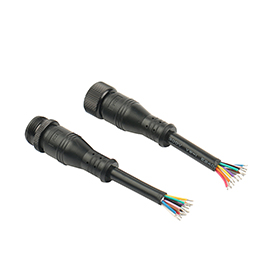News


News

IP68 Waterproof connectors for automobiles: Design Secrets and Technological Breakthroughs
Release time:2025-03-10
viewed:490
Under the wave of intelligence and electrification, the protection requirements for automotive electronic systems for connectors have reached unprecedented heights. IP68, as the highest commercial-grade standard in waterproof and dustproof performance (submersion in ≥1 meter of water for ≥24 hours + complete dust resistance), has become the core safeguard for key components such as high-voltage batteries, LiDAR, and domain controllers. Below, we delve into the core technical features of IP68 Waterproof connectors for automobiles and explore how they achieve "waterproof and dustproof" performance in extreme environments.

Complete Dust Resistance: Tested in a 1μm diameter dust environment for 8 hours with zero particle ingress.
Structural Design: Multi-stage labyrinth seals + negative pressure balance valves to prevent dust infiltration via pressure differentials.
Test Conditions: Submersion depth agreed between manufacturer and user (typically ≥1 meter) for ≥24 hours.
Performance Requirements: No internal water ingress, insulation resistance >100MΩ (per IEC 60529 standard).
Primary O-Ring Seal: Fluorocarbon rubber (FKM) with precise compression control (15%-25%, ISO 3601 standard) ensures constant contact pressure.
Threaded Secondary Seal: 2-3 reverse threads enhance sealing interface stability through mechanical locking.
Potting Tertiary Seal: Vacuum-injected silicone fills microscopic gaps (porosity <0.05%) to block capillary penetration.
Dust Barrier: PTFE microporous membrane (pore size <1μm) inside the metal housing allows airflow while blocking dust.
Drainage Channels: Bottom-mounted grooves rapidly expel condensation or accidental water ingress.
Seals: Fluorocarbon rubber (FKM) resists acids/alkalis (pH 1-14); silicone rubber (VMQ) withstands -50°C to 200°C.
Housing: PA66-GF35 engineering plastic (tensile strength >150MPa) + PVD coating (salt spray resistance >1,000 hours).
Insulators: Liquid crystal polymer (LCP) with moisture absorption <0.02% prevents insulation degradation.
Contact Plating: Gold plating ≥0.2μm thick resists micro-abrasion; surface roughness Ra ≤0.4μm minimizes dust adhesion.
Lubrication: Perfluoropolyether (PFPE) grease combines waterproofing with dust repellency.
Vacuum Potting: Vacuum ≤0.1mbar ensures bubble-free filling.
Curing Control: Gradient curing (25°C→85°C at ≤2°C/min) eliminates internal stress.
Hydrophobic Coating: Nano-silica coating with contact angle >150° enables self-cleaning water droplets.
Metal Protection: Trivalent chromium passivation (RoHS-compliant) triples salt spray resistance.
Pressure Cycling: 1-meter submersion + 50kPa pressure fluctuations (simulating water wading).
Thermal Shock: -40°C↔125°C rapid cycling (1,000 cycles) validates material compatibility.
Insulation Resistance: >1GΩ at 500V DC (IEC 60664-1).
Voltage Endurance: 1.5kV AC/1min without breakdown (exceeds automotive high-voltage requirements).
IP68 Waterproof connectors for automobiles transform protection capabilities from "passive resistance" to "proactive adaptation" through material, structural, and process innovations. As 800V platforms and autonomous systems proliferate, IP68 is no longer just a specification—it is a cornerstone of automotive competitiveness.